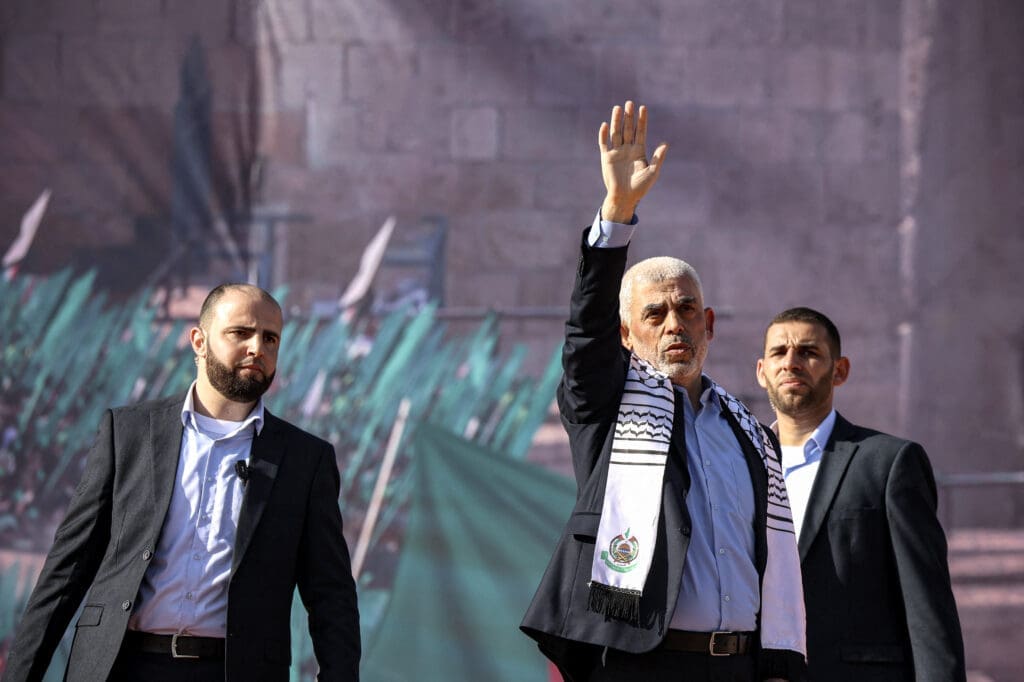On August 6, Hamas announced that its Shura Council had appointed Yahya Sinwar, the leader of the movement in Gaza, as the new head of the group’s politburo. The decision came a week after Israel assassinated Hamas’ previous political leader, Ismail Haniyeh, in Tehran. In this interview, Beverley Milton-Edwards, co-author of Hamas: The Quest for Power (Polity Press, 2024), and Senior Nonresident Fellow at the Middle East Council offers her insights on what Sinwar’s appointment means for Hamas and its future.
1. Sinwar was elected by Shura Council vote. Do you know if this process took place in the manner of previous leadership votes, given the circumstances that Hamas is currently facing? What does Sinwar’s rise tell us, and should we expect a different Hamas with him at the overall political helm, rather than just presiding over Gaza’s leadership?
Normally, leadership elections for the Hamas organization have a longer lead-in than the one that took place less than a week after the assassination of Ismail Haniyeh. These are exceptional circumstances for Hamas, and leadership is more important than ever while the group faces an existential assault. Sinwar’s elevation to the top of Hamas is a clear message from the group to Israel—one of defiance and determination to continue their fight on behalf of the Palestinian people against the Israeli occupier.
In his new role, there may well be changes in the political tactics of the movement in the ongoing phase. There were major differences between Haniyeh’s experiences and those of Sinwar at the hands of their Israeli enemy, and this has certainly shaped their views on the trustworthiness of political counterparts such as Israeli Prime Minister Netanyahu.
Furthermore, since 2017 Haniyeh had been exiled from Gaza—focused on external connections and political dynamics in the region and beyond in ways that Sinwar never was. Nevertheless, Sinwar’s position will also be counterbalanced by other dynamics at work more broadly in the leadership team, which includes Khaled Meshal, Khalil al Hayya, and Musa Abu Marzouq.
2. Sinwar spent decades in Israeli prisons and was very much a student of Israeli society, politics and security. What do we know about his vision and strategy and how might they differ from those of some of his counterparts in the leadership?
As I detail in my new co-authored book on Hamas, Sinwar reflected deeply on the time in which he was imprisoned by Israel, telling us, “they wanted jail to be a grave for us. A mill to grind our will, determination, and bodies.” Yet his will appears indomitable. On the day of his release in 2011, after twenty-two years of jail, Sinwar addressed a huge rally in Gaza to celebrate his freedom by pledging to release all Palestinian prisoners with an “immediate plan” with all resources being given to it.
His vision and strategy are laser-focused on the Hamas objective of ending Israeli occupation by all and any means. For Sinwar, no sign of weakness is ever permitted; he is more of a hard-liner than Haniyeh and other Hamas leaders have ever been. In this respect he is closer to Hamas co-founder Dr. Abdel Aziz Rantissi, who like its other leader, Sheikh Ahmed Yassin, was assassinated by Israel in Gaza in 2004. Sinwar was also born and raised in Gaza and has rarely, if ever, traveled abroad and engaged in ways that his counterparts do in these present times. This means that his worldview is primarily focused on Gaza, the travails and sufferings of its 2.3 million inhabitants, and the resistance he directs for their freedom.
3. What about the talks to achieve a release of the prisoners and a ceasefire?
Some will consider the appointment of Sinwar as a stumbling block, but in fact, he has been a key player in all the mediated negotiations to release Palestinian prisoners and to get humanitarian aid to all of Gaza in exchange for returning the Israelis and those of other nationalities held hostage.
Indeed, it was down to his say-so that over 100 hostages were released in late November last year, that Palestinian prisoners received their freedom, and that some humanitarian relief came to Gaza. Everyone—including Israel’s political leadership, the head of Mossad David Barnea, Shin Bet chief Ronen Bar, and CIA head William Burns—knows that Sinwar not only played a vital role in those negotiations but was decisive in securing those precious days of “calm” in Gaza.
As for the current negotiations of a ceasefire plan for Gaza, and the part they may play in de-escalating tensions elsewhere in the region, even Israel’s own security chiefs and many in the Biden administration blame Netanyahu—not Sinwar—for imperiling an agreement. It is Netanyahu, therefore, that is being accused of sabotage.
Hence even Netanyahu’s own security, military and intelligence are being undermined, in the middle of negotiations mediated by Qatar, by the bad-faith actions of the Israeli prime minister. The assassination of Haniyeh was one such action leading to the consequence of Sinwar being elected as his replacement. It should be noted that Sinwar has offered a long-term ceasefire deal to Netanyahu before.
4. It is clear that October 7 and what followed has been a paradigm shift for Gaza and its people and for the Palestinian national movement, Israel and Hamas. After ten months, how do you expect that Hamas might emerge from this war? Will the group look similar or be radically changed? And how will it respond to the new political context?
The events of October 7, 2023, and the inferno that ignited in its aftermath leave the future of Palestine and Israel, along with the rest of the Middle East region, unclear. Israel’s leaders vowed to destroy Hamas, and there is little doubt that Hamas will emerge from the war as a changed movement.
It has to be acknowledged that despite the “victory” narratives that circulate on social media and Telegram channels after every Hamas strike against its far better equipped, resourced and trained enemies, its military wing—the Izz-a-din al-Qassam Brigades—has been depleted and degraded. Yet, the ability of the Qassam Brigades’ commanders to re-group, launch rockets against Israel and frequently fight enemy forces to a standstill on the ground in Gaza means it is far from finished. Unless Hamas is recognized politically in a post-war dispensation, insurgency surely beckons.
Hamas has spent many months, years and decades working with other Palestinian factions to remain part of a political consensus that is based on the demand that the legitimate rights of the Palestinian people be secured according to a political horizon that includes a formula for statehood and international recognition. If no political solution is offered, and only the prospect of a prolonged Israeli occupation and siege remains, Hamas will respond as it always has done. As one of its leaders, Ayman Nofal once declared to me, “the world is in a hurry, we in Hamas are not.”


